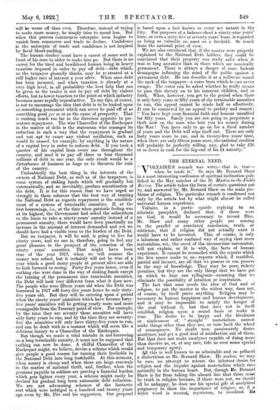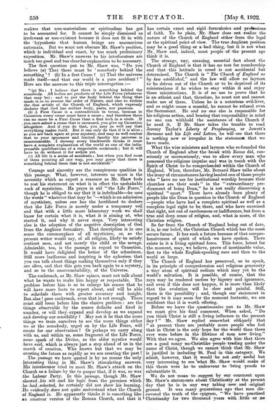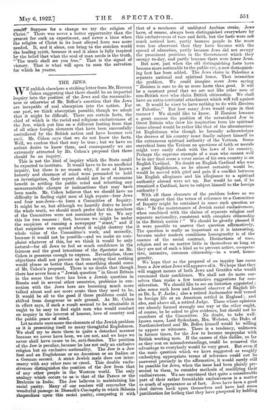THE ETERNAL NEED.
" VOLTAIRE'S remark was witty—that is, true— when he made it." So says Mr. Bernard Shaw in a most interesting confession of spiritual inclination pub- lished in the May number of the St. Martin-in-the-Fields Review. The article takes the form of certain questions put to, and answered by, Mr. Bernard Shaw on the main pro- blems of religion. The particular remark is confirmed not only by the article but by what might almost be called universal human experience. Voltaire, in a poetic epistle replying to an atheistic pamphlet, declared that, if there were no God, it would be necessary to invent Him. Mr. Shaw and many other people are coming to the parallel or correlated conclusion, truth, or witticism, that if ,religion did not actually exist it would have to be invented. This, of course, is only a laborious and rather confused way of saying that mere materialism, viz., the creed of the unconscious automaton, will not explain, or fit in with, the facts of human experience. It cannot be reconciled with the reports which the five senses make to us—reports which, if muddled, partial and inexact, are all that we possess or can possess in the way of knowledge. They may be poor, rickety premises but they are the only things that we have got on which to base our syllogisms—assuming that we eliminate the possibility of intuition or inspiration. The fact that • man needs the idea of God and of religion, to put the matter in the widest way, does not, of course, by itself prove anything. Religion may be necessary to human happiness and human development, and it may be impossible to satisfy the hunger of the soul without it, but that does not in itself establish religion upon a sound basis or make it true. The desire to be happy and the bleakness or aimlessness of " straight ' materialism cannot make things other than they are, or turn back the wheel of consequence. No doubt men passionately desire anodynes, and get a good deal of satisfaction out of them. But that does not make anodynes capable of doing more than deceive us, or, at any rate, tide us over some special and temporary agony. All this is well known to so admirable and so pellucid a dialectician as Mr. Bernard Shaw. He makes, we may be sure, no attempt to misuse the inherent desire for religion and the impulse against materialism which rises naturally in the human heart. But, though Mr. Bernard Shaw is far from taking the absurd line that there must be truth in religion because, if there were not, we should all be unhappy, he does use his special gift of analytical poignancy to show the importance of religion, or, if a wider word is wanted, mysticism, to mankind. He realizes that non-materialism or spiritualism has • got to be accounted for. It cannot be simply dismissed •as irrelevant or- non-existent •bemuse it does not fit • in with the 'hypothesis -that -human beings are unconscious automata. But we must not - obscurelfr. Shaw?s position, which - is individual -and exact, - by too mush preliminary exposition. Mr. Shaw's answers to his interlocutors are much tocegmfd and too- °leerier explanation to be necessary. The ' first question put to 'Mr. Shaw was, Do you believe (a) That - there must be somebody -behind the something ' •? (b)In a- first Cause ? (e) That the universe made itself--and that our world is - a pure - accident ? " Here are the-answers' to-this triple interrogation Nu) No : I believe that there is something behind the somebody. Att bodies are, products of the Life- Force (whatever that may be) ; - and to put the body -behind .the thing: that made it-is...to.rreverse the order of Nature, -and -also - to :violate .the :first article ,ef the Church-of England, which expressly .declares that God. has neither body, parts, nor passions. 0) A First Cause- is a contradiction in terms, because in Causation every- cause must- havee-a cause ; and therefere- there ean.no -more be a First. Cause than a first inch_ circle. cIf you, eace,admit a cause that is uncaused, you give,up Causation ..altogether. And if -you do that, you may as well say that _everything makes itself. But it can only do that if it is alive ; so you anr back again at your mystery,- and-may as-well confess that to your -ignorance and limited . faculty the _universe is unsoconatable. daresay every blackbeetle thinks it must have.-a complete. explanation of, the world as one of the, indis- pensable qualifications, of a respectable cockroach ; but it will have to -do without it. for awhile yet. (c) All life is a series- of-acaidenta ; ..but-when you find most of them pointing all one way, YOU may _guess that there is something behind- them that is not-accidental."
Courage and sincerity are the conspicuous -qualities in this passage. What, however, interests -us -most is the necessity which so expert a reasoner as Mr. Shaw feels to rest his statement on what is in effect the unshakable rock of mysticism. :He prays in aid ''-the 'Life 'Force," though he is obliged' to say. that it- is indefinable—he-uses' the woedrc" whatever that may he "—which is an admission of mysticism, unless one •has the - hardihood - ..declare that the Life Force As merely under a temporary veil and that with a little more laboratory -work --we -shall know for certain what it is, what . it is aiming -at, whoi started it, and why it never stops. 'Very interesting! also is the adoption of the negative description -of God, from' the Anglican formulary. That description is- in one sense . the commonplace of all mysticism, or, as -the, present -writer would say, of all religion, likely-to satisfy, sentient men, and not merely -the child or the -savage. Admirable, too, is the passage in regard -to • Causation. - It -would have delighted the better of the scho.ohnen.: Still more luciferous and inspiring is the aphorism •that you can talk about things making themselves only-if they are; alive, and that this gets you back again- to a mystery, and so to 'the . unaccountability, of the Universe.
-Thecockroach, as Mr. -Shaw opines, must not talk about what he -wants to make him happy or respectable. The problem before him- is so to enlarge his senses that he will have more facts to report about, and will be able , to schedule ; them with greater accuracy -and insight. Butolas !.poor cockroach, even that is not enough. There must. still loom before him the elusive problem : are the things observable by the senses definite and fixed in number, or ,will they,. expand and develop as we expand and develop ourAensibility ? ,May not it be that the more things we train , ourselves to see the more things either we er the somebody, urged on by the Life Force, - will create for our observation ? Or perhaps we carry along with us, aud within us, some -fragment Of the Life 'Force, -some „spark of :the Divine, as the older mystics would have-said, which is, always just a step ahead of us in the march of creation. Who knows but that we may be creating _the future as rapidly _as we are creating-the 'past ! The passage we have quoted is by no - means the 'only .mteresting thing in Mr. Shaw's stimulating answers. His interlocutor -tried to meet Mr. Shaw's Attack on the Church as :a failuraby the to quoque that,' it it was, so was -.the 14abonr -]?arty. In this passage, though Mr. Shaw showed :_his -wit -and his logic from the premises Which he had. ,selected, he certainly did not Show:his learning. -He evidently. does not. quite .widerstand what the Church of England is. ale apparently thinks it is• something like an amateur version of the Roman Church, and that it has certain exact and •rigid ,formularies And professions of , faith. To be plain, ',Mr. Shaw does not - realize the nature of the Church - of England either from the legal or the spiritual point of, view. The true. Anglican position may be -a - good•-thing.er alhad thing, but it is not what Mr. Shaw and, indeed, most people 'of (the present age think it is.
The strange, -nay, amazing, essential fact about the Church of England is that it? has, no' test- for- membership and . that this latitude in creed .is 'mot accidental but determined. The Church is " 7..he Church of England as by • law established," and the law will allow no layman to. be :driven out of the Church or to be deprived, of its ministrations if he wishes to '-stay within • it and enjoy those ministrations. It is of no • use to prove that he is an- atheist and •that, therefore, he must not and cannot make use of them. Unless he is' a notorious, evil-liver, and• so might -cause -a scandal, he cannot --be refused- even the Sacrament. He -and no one else is responsible for his-religious action, and bearing that responsibility in mind no one can withhold the assistance, of -the Church if he need -it. If Mr. Shaw takes the trouble to read Jeremy Taylor's Liberty of Prophesying, or Jowett's -Sermons-and his Life arid Letters, -he will-see that there is nothing new or irregular in the statement that we have -made.
What the wise ministers anct laymen -who re-founded the Church of England after the break -with Rome did, con- sciously or unconsciously, was to allow -every man who eased the-religious impulse and -was in touch with ihe pirit- of Christ -to-rboeomprehencled. -within the Church of England. When, therefore, Mr. Bernard Shaw talks about the irony of circumstances having landed one of those people who "have no use for institutional worship because their churches are their souls" in the "extraordinary pre- -die,ament of being Dean," • he is net really discovering a -spiritual sport" There have already = been . plenty of people- like the Dean in question in • the Church of England —people who have had a completespiritual as well as a complete- legal right to be there, and who have exercised that right, not out of carelessness or indifference, but from a true and deep sense-of religion, and,.what is more, of the Christian religion.
So far-from the Church of -England • being, out of date, it is, in-our belief, the Christian Church which- has the most secure future. It has such a future because of that compre- -hensiveness of spirit of which • we have _spoken. There exists in it a living spiritual• force. This force, latent for the moment, may, -we believe, prove of, inestimable value, first to the whole English-speaking race and then to the world at large. The 'Church -of England has preserved, so to speak, in its principle of comprehension and religious generosity a tiny atom of spiritual radium which may yet be the world's salvation. It is possible, of course, that the rays may be rendered useless by bigotry • and -ignorance, and even if this does not happen, it is -more' than likely that the evolution will be slow and painful. Still, there is the possibility ; and, • though our statement in regard - to it may -seen 'for the 'moment fantastic, •we are confident that it- is- worth offering. Before -we leave the questionnaire -put to Mr. , Shaw we must give his -final -comment. -When asked, " Do you think 'Christ is still -a' living influence' in the present day'? " 'Mr. -Shaw replied somewhat obliquely that " at present -there are • probably -more people who feel that in Christ 'is the only hope for- the world • than, there ever were before in the lifetime of -men now living." With that we agree. We- also agree • with him that -there are a good many -nn-Christlike -people 'trading under the name of Christ, -though we cannot think that 'Mr. Shaw is justified in including 'St. -Paul - in -this category. We admit, however, that it would -be net only -useful but very interesting to see !what -Mr. =Shaw • -would , make of this thesis were he -to -endeavour to 'bring proofs to substantiate 'it.
We do not -mean to suggest by 'our comment upon 'Mr. Shaw's, statements about' Christianity at 'the present day that he -is in any way taking -new; and :original ground. It was many .generations -ago 'that men dis- covered -the truth of the epigram, " We have . practised Christianity for two thoUsand -years with ;Attie •or ue result? Suppose for a change we try the religion of Christ." There was never a better opportunity than the present for such an experiment, and neeer a time when the religion of Christ in its least alloyed form was more needed: It; and it alone, can bring to the stricken world the healing. spirit,. because it. and it alone is fully inspired by the belief. that what the soul• of man needs is the truth. " The: truth' shall set you. free." That is the signal of victory. That• is. what will open. to man the salvation for which, he yearns.




































 Previous page
Previous page